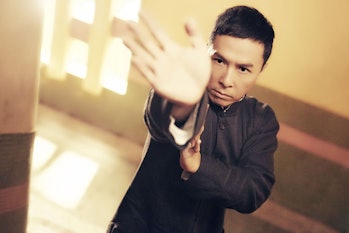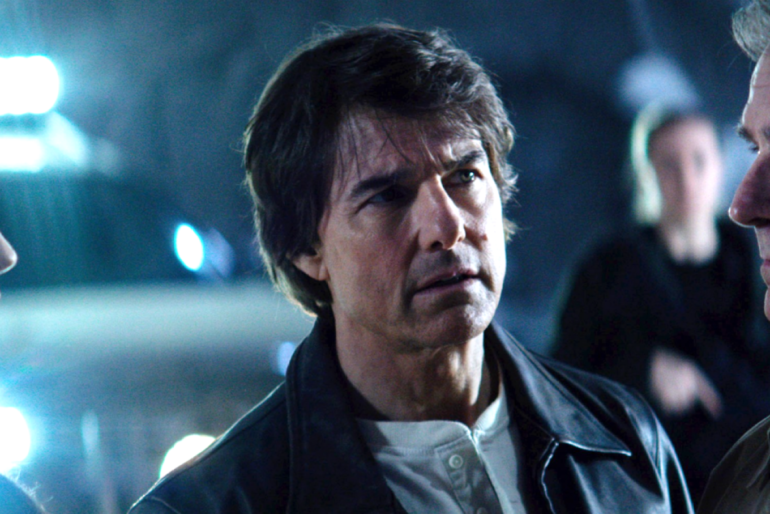chevron_left
-
play_arrow
NGradio So good... like you
The best kung fu movie franchise you ‘ve never seen is streaming on Netflix

Late into Ip Man (2008), the martial arts biopic of Grandmaster Ip Man from director Wilson Yip, Donnie Yen walks into a dojo surrounded by a horde of black belt karatekas. Yen, best known to Star Wars fans as the space monk Chirrut Îmwe in Rogue One, appears as the title folk hero in what would become the first in a blockbuster franchise that you can finally watch all in one convenient place.
Dressed in peasant garb, Yen’s Ip Man signals to his ten opponents he’s ready. A musical crescendo kicks off the mayhem: Broken bones, stomped faces, and the thunderous impact of lightning-quick punches, all delivered with tangible ferocity.
The film’s post-production sound does much of the heavy lifting. Every punch and slap sounds like a Foley artist whipped a soaked towel against solid oak. The piece de resistance is when Ip Man traps a poor soul into a chain-punch on the ground, pounding on his face with fists like a jackhammer.
This scene, all three glorious minutes of it, best characterizes the Ip Man films, a series of biopics “based” on the life of Wing Chun grandmaster Ip Man, teacher of Bruce Lee. Though Ip Man’s claim to fame is mentoring the pop culture icon, he has become a folk hero on his own, held in high regard as an avatar for Chinese nationalism (despite his direct opposition to the currently ruling Chinese government).
And it’s all because of these movies. Though they liberally stretch the definition of truth and their escalating scale is in violation of Wing Chun’s principles of efficiency, the Ip Man film series all stand tall as true kung fu epics for the 21st century. They are at once relics of a kind of movie that no longer exists, as well as emblematic examples of kung fu movies at their prime. And right now, they are all streaming on Netflix.
Here’s why you need to spend your week and weekend binge-watching the greatest kung fu movies of the 2010s.

WHAT’S STREAMING ON NETFLIX?
The Ip Man film series with Donnie Yen is currently available to watch on Netflix. These include:
- Ip Man (2008), the first film in the series. Set in the 1930s, the film fictionalizes the events in Master Ip’s life in Foshan during the Sino-Japanese War.
- Ip Man 2 (2010), a continuation set in 1949 that chronicles Ip Man’s life in Hong Kong.
- Ip Man 3 (2015), set in 1959 that introduces Bruce Lee (played by Danny Chan). Boxer Mike Tyson stars in the film as an American gangster/entrepreneur who fights Ip Man.
- Master Z: Ip Man Legacy (2018), a spin-off starring Max Zhang reprising his role as Ip Man’s rival in Ip Man 3.
- Ip Man 4: The Finale (2019), the final movie in the series that greatly fictionalizes Ip Man’s final years.
Separate from this series and also on Netflix is the 2013 film The Grandmaster, directed by legend Wong Kar-wai and choreographed by Yuen Woo-ping (of The Matrix and Kill Bill). In contrast to Yen’s Ip Man, The Grandmaster interprets Ip Man’s life during the Second Sino-Japanese War with a comparatively meditative story about the modernization of kung fu at the dawn of the 20th century. Tony Leung, a celebrated Chinese actor American audiences will finally meet in the 2021 Marvel movie Shang-Chi and the Legend of the Ten Rings, stars as Ip Man.
There are other unrelated Ip Man movies, like 2010’s The Legend Is Born: Ip Man with Dennis To and 2013’s Ip Man: the Final Fight with Anthony Wong, neither of which are on Netflix. But with the Yen series and Wong Kar-wai’s Grandmaster, you have all you need to dive in.

WHO WAS IP MAN?
Born in 1893, Ip Man was raised by a wealthy family in Foshan. At a young age (there are conflicting records that cite him at age nine or 13), he took up Wing Chun, a distinct form of Southern Chinese kung fu.
Before and after the Second Sino-Japanese War, Ip Man was a policeman, but during the war he lived with a former student to resist Japanese occupation. Years later, another conflict emerged: The Chinese Civil War. Opposed to the Chinese Communist Party, Ip Man fled to Hong Kong, where he would meet his most famous student, Bruce Lee.
Ip Man died of Laryngeal cancer in 1972, at age 79, seven months before Bruce Lee’s own death. He lived his final years addicted to opium. He was known to use his students’ tuition money to support his drug habit.
Ip Man didn’t invent Wing Chun — Ng Mui is credited as Wing Chun’s inventor, dating to the 16th or 17th century — but Ip Man is strongly associated with the style. What makes Wing Chun distinct are its principles. As defined by the International Wing Chun Academy, Wing Chun emphasizes minimalism. To know Wing Chun means you know how not to waste time, movement, and energy. Watch the movies, specifically the one-vs-ten fight closely. You may notice Ip Man’s movements aren’t elegant or over-the-top, but direct and without flourish.
WHY THE IP MAN FILMS MATTER
The popularity and appeal of the Ip Man movies, particularly in China, is obvious. Besides the patriotism that drives Ip Man’s stories, the films have led to a visible resurgence in the practice of Wing Chun, spreading everywhere from the United States to Palestine.
But as movies themselves, they are emblematic of kung fu cinema, a genre that has undergone a transformation under the shadow of billion-dollar superhero movies. They’re not extinct, they’re just different, prone to more violence and CGI than in the days of Jackie Chan and the Shaw Brothers.
While westerners have long underestimated kung fu films as cheap attractions for the seedy theaters of old Times Square, kung fu films were (and still are) operatic tales not unlike those of Greek myth. In most, if not all kung fu movies, there is a spunky hero whose natural talent — refined by rigorous training — is weaponized to save the farm, the village, and sometimes, the world. The Ip Man franchise, in its story about a one-man resistance against imperial forces, is a universally irresistible journey. It doesn’t take much to equate Ip Man to Luke Skywalker.

The Ip Man movies aren’t perfect. As the films introduce western characters and settings, the clunky scripting borders on the absurd. And as an Asian-American, the Chinese nationalism can get very dizzying. It’s also a given that virtually nothing you see is in any way based on true life. (In Ip Man 4, the grandmaster fights bullies at an American high school in the 1950s.) The more prestigious The Grandmaster, meanwhile, is loaded with action but remains at the mercy of a traditionally dramatic auteur in Wong Kar-wai. Breathtaking as it looks, it doesn’t have the feverish energy of Yen’s more impossible blockbusters.
But taken as a whole and Ip Man, though a complicated figure in real life, is as relatable and folksy as any other great movie character. Like Luke Skywalker or John McClane, Ip Man’s story is always about overcoming impossible odds in a changing world. As his greatest student would say: Ip Man was like water. For now, you can see it for yourself.
Source: inverse.com
Written by: New Generation Radio
Similar posts
ΔΗΜΟΦΙΛΗ ΑΡΘΡΑ
COPYRIGHT 2020. NGRADIO




















Post comments (0)